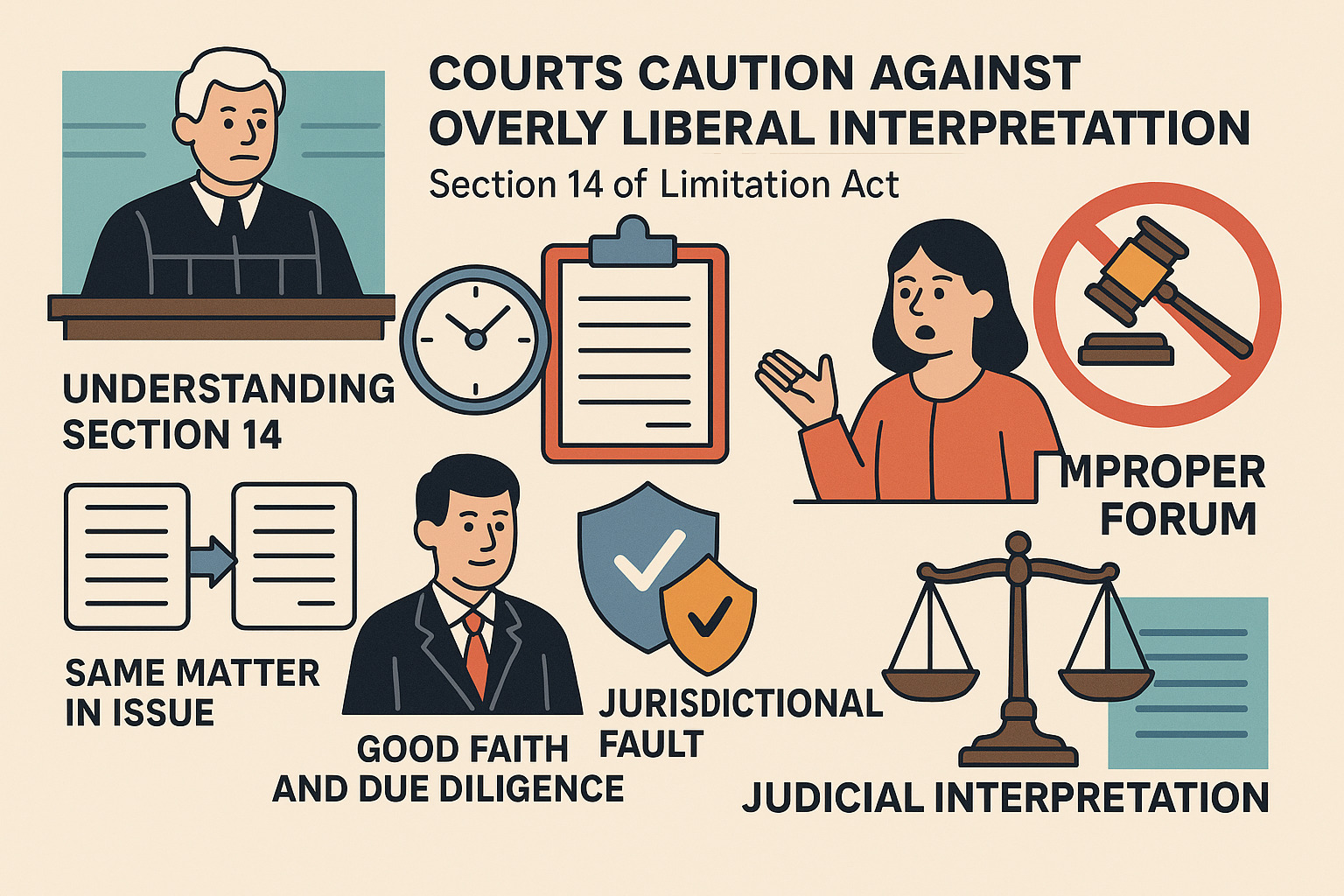View News
Courts-Caution-Against-Overly-Liberal-Interpretation

Benefit of Section 14 of the Limitation Act: Courts Caution Against Overly Liberal Interpretation
As a corrective measure, Section 14 of the Limitation Act, 1963, permits parties to omit time spent in legitimate procedures before a court that eventually lacks jurisdiction. Courts have often stressed that the provision's application must not be so liberal as to defeat the intent of limitation statutes, even when it attempts to prevent injustice because of technicalities.
Understanding Section 14
According to Section 14, when calculating the statute of limitations for a suit, the time that the plaintiff has been diligently pursuing another civil proceeding against the defendant, whether in a court of first instance, an appeal, or a revision, shall be excluded if the proceeding is based on the same cause of action and is being pursued in good faith in a court that is unable to consider it due to a defect of jurisdiction or another similar reason.
The following are essential components for using Section 14:
1. Same Matter in Issue: The subject matter of the earlier and later procedures must be the same.
2. Good Faith and Due Diligence: Honesty and reasonable care must have been used in the previous proceeding.
3. Jurisdictional fault: A jurisdictional fault or related problem must have prevented the prior court from considering the case.
Judicial Interpretation: Balancing Liberalism with Caution
Courts have acknowledged that although a liberal interpretation of Section 14 is necessary to further the cause of justice, it must not be so broad as to invalidate the statute of limitations.
The Supreme Court ruled in Commissioner, M.P. Housing Board v. Mohanlal and Company that, even under a liberal interpretation, the clause is inapplicable if the subject matter of the previous and subsequent cases is different. The Court underlined that Section 14 cannot be applied if due diligence and good faith are not present.
Similar to this, the Supreme Court noted in Basawaraj and Anr. v. Special Land Acquisition Officer that the statute's requirements for the application of the law of limitation must be strictly adhered to. Under the pretense of liberal interpretation, carelessness or inaction cannot be excused, and courts lack the authority to extend the statute of limitations on equitable grounds.
Application in Arbitration and Insolvency Proceedings
The applicability of Section 14 has also been examined in the context of arbitration and insolvency proceedings.
The Supreme Court permitted the exclusion of time under Section 14 for raising objections under Section 34 of the Arbitration and Conciliation Act, 1996 in Kirpal Singh v. Government of India. The delay resulted from pursuing remedies in the High Court based on a misguided interpretation of jurisdiction. The Court observed that there was no express clause denying Section 14's applicability to the Arbitration Act and that the appellant had acted in good faith.
In Sesh Nath Singh v. Baidyabati Sheoraphuli Cooperative Bank Ltd., the Supreme Court ruled that applications under Sections 7 and 9 of the Insolvency and Bankruptcy Code (IBC) are subject to Section 14 of the Limitation Act. The Court stressed that any forum for a civil procedure, including tribunals under the IBC, would be included in the definition of "court" in Section 14.
Conclusion
For litigants who, in spite of their sincere attempts, end themselves in the improper forum, Section 14 of the Limitation Act provides protection. To maintain the integrity of limitation laws, courts are watchful for its abuse, and its implementation is subject to rigorous adherence to its terms. To prevent injustice, a liberal interpretation is necessary, but it shouldn't be so broad as to negate the statute of limitations' effectiveness.
-By Prerna Yadav (LegalMantra.net)
"Unlock the Potential of Legal Expertise with LegalMantra.net - Your Trusted Legal Consultancy Partner"
Disclaimer: Every effort has been made to avoid errors or omissions in this material in spite of this, errors may creep in. Any mistake, error or discrepancy noted may be brought to our notice which shall be taken care of in the next edition In no event the author shall be liable for any direct indirect, special or incidental damage resulting from or arising out of or in connection with the use of this information Many sources have been considered including Newspapers, Journals, Bare Acts, Case Materials , Charted Secretary, Research Papers etc

